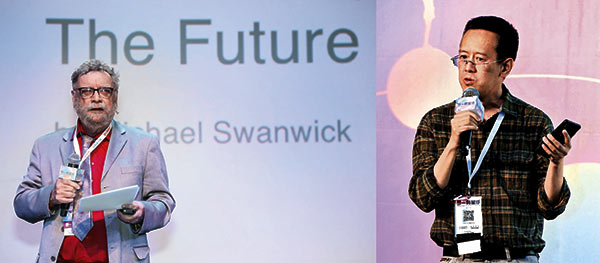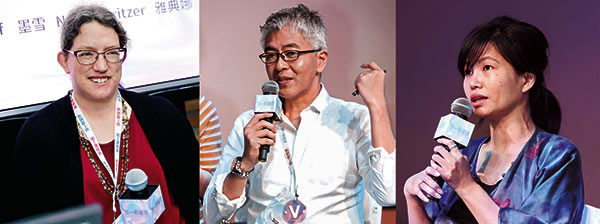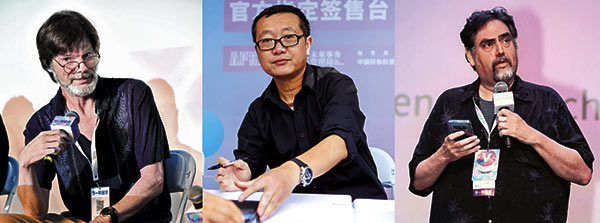SF in Beijing Report

I had the good fortune of attending Another Planet Science Fiction Convention from May 22-23, 2019 at the Chaoyang Museum of Urban Planning in Beijing, China. It’s the second year of this four-track con celebrating Chinese and world science fiction. The conference is organized by the Future Affairs Administration (FAA), a private multimedia SF company looking to create a meeting place for authors, fans, movie producers and directors, special effects and artificial reality experts, and scientists.
This year’s Chinese SF guests included authors such as Jiang Bo, Chen Quifan (author of Tor’s Waste Tide), Vera Sun, and Alex Li (editors of Non-Exist Magazine), and the first assembling of the big four Chinese SF writers: Han Song, Liu Cixin, Wang Jinkang, and He Xi. New authors included rising talents such as Su Min, Liang Ling (soon to be published in English translation), Teng Ye, Su Wanwen, and Zhou Wen (who will be on a George R.R. Martin-funded scholarship to the US later this year). Other Chinese guests included some of the scientists who put Chang’e-4 on the far side of the moon; Frant Gwo, the director of China’s first smash big budget SF movie The Wandering Earth; Yao Haijun, the editor-in-chief of the publisher SFWorld; and many others.

This year’s invited foreign guests included authors such as South Korea’s Kim Boyoung, Japan’s Fujii Taiyo, Australia’s Samantha Murray, Canada’s Kelly Robson and myself, and Naomi Kritzer, Michael Swanwick, Allen Steele, Lawrence Schoen from the United States. Other invited guests included David Sheldon-Hicks of Territory Studios (visual effects studio on a ton of MCU movies), Sean Stewart (creative design director at Magic Leap, an augmented reality company in Hollywood), and science fiction organizer and activist Crystal Huff.
The programming focused on topics like new movies and books and developments in Chinese science, as well as meet-the-author events, signings, and panel discussions. Two of the panel rooms were equipped with real-time machine voice recognition and machine translation on screens behind the panelists. These were surprisingly effective. I certainly understood 3/4 of the discussions and was entertained by some of the funny misunderstandings in either the voice recognition or AI translation for the rest. Some of the panels with foreign guests included very nice human translators.

It’s interesting to try to understand where Chinese science fiction conferences are coming from and why this one in particular is being led by a multi-media SF company. I chatted with Ji Shaoting, the CEO of FAA. She’s a former journalist at the Xinhua news Agency who later co-founded Guokr, a massive Chinese-language pop-science website with a few stories, and pop-culture blog, and a fan club called Future Affairs Administration. Her work with FAA and Guokr caught the attention of an investor who wanted to create a repository of IP that could be developed into movies, TV, games, etc., because he “believes in the imagination industry.” FAA transitioned from a fan club into a company whose business goals are publishing SF and developing new Chinese writers.
FAA publishes an online magazine called Non-Exist, which publishes original Chinese SF works and western authors in translation. For works that they publish, they often pay an additional fee for the opportunity to represent a work for dramatic rights exploitation for 5 years. They’ve now amassed an IP bank of 800 stories (full disclosure: including a few of mine) and have 10 million fans on their Weibo social media channel. They’ve also successfully shepherded several pieces of IP into development, including Liu Cixin’s Fire Keeper (in animation development) and Sea of Dreams (in development as an online TV series), and Han Song’s Cold War and Messenger (both being developed as movies).

FAA has also run courses for Chinese SF authors and organized mass writing events with many dozens of authors working to writing prompts like “New Year’s Homecoming” on tight deadlines. FAA has also developed corporate partnerships to bring Chinese and Western writers to see different efforts in China to inspire commissioned stories. Writers have gone to tour high tech financial services company Alipay in Hangzhou, a poverty reduction initiative in Danzhai County in partnership with the company Wanda (see the write-up in Locus by Kelly Robson), and the Chinese Academy of Art. Other partnerships with large, future-looking utilities are happening or are in the works. Ms. Ji noted that they do this because “writers need to get first-hand experiences and knowledge, not just get it second hand.”
A natural progression for FAA, then, was the founding of Future SF with Chinese-speaking editor Alex Li and English-speaking editor Alex Shvartsman, such that translated Chinese stories would have a steady outlet into the English-speaking readership. A further progression was the launching of the first Another Planet SF Conference in 2018, with the goal of bringing together the creators of IP (authors) with editors, special effects professionals, scientists, directors, and producers. It is modelled initially on WorldCon with a focus on fans and readers, but the involvement of movie, TV, and games developers seems to be a conscious and deliberate step to showcase writers and their IP in an attractive light.

Because this was a different kind of conference, I asked David Sheldon-Hicks why he’d accepted the invitation to travel to Beijing from London. He said that he’d come to meet the Chinese directors who were here, some of whom he was already working with, and some of whom it would be good to know. Moreover, as a visual effects professional on movies like Blade Runner 2049 and The Martian, he sees IP late in the process, so it was an opportunity for him to understand the literary creative process. He appreciated that APSFCon was “creating a conversation between authors and directors.” We discussed the Chinese SF movie industry and Sheldon-Hicks noted “they’re building things from the ground up, which means that they’re not beholden to history. I want to be part of the journey of their industry and maybe their experiences will teach me things I can apply in Hollywood.” He is also interested in the challenge of a new audience.

Would I say western authors should think about attending the con? APSFCon is far away, but less than we sometimes think. Travel from any major airline hub isn’t much more than flying to Dublin, and the hotel we stayed at is cheaper than many con hotels in the US and Canada. Beijing is a modern city with lots of cultural and artistic things to see, like the Summer Palace, the Forbidden City, a bunch of temples, the National Museum, the National Art Museum, the Great Wall, and so on. A visit to APSFCon could be paired with a week in Beijing to try new foods and see ancient, medieval, and modern culture. The subway is pretty intuitive and our phones have all sorts of insta-translation apps offline or supported by roaming or Chinese SIM cards. English speakers on the streets of Beijing are not at all numerous, but the con feels like it has more of them. It’s more of an adventure than your regular con experience, but if you’ve never been to China, this is a wonderful motivator.
–Derek Künsken
This report and more like it in the August 2019 issue of Locus.
 While you are here, please take a moment to support Locus with a one-time or recurring donation. We rely on reader donations to keep the magazine and site going, and would like to keep the site paywall free, but WE NEED YOUR FINANCIAL SUPPORT to continue quality coverage of the science fiction and fantasy field.
While you are here, please take a moment to support Locus with a one-time or recurring donation. We rely on reader donations to keep the magazine and site going, and would like to keep the site paywall free, but WE NEED YOUR FINANCIAL SUPPORT to continue quality coverage of the science fiction and fantasy field.






